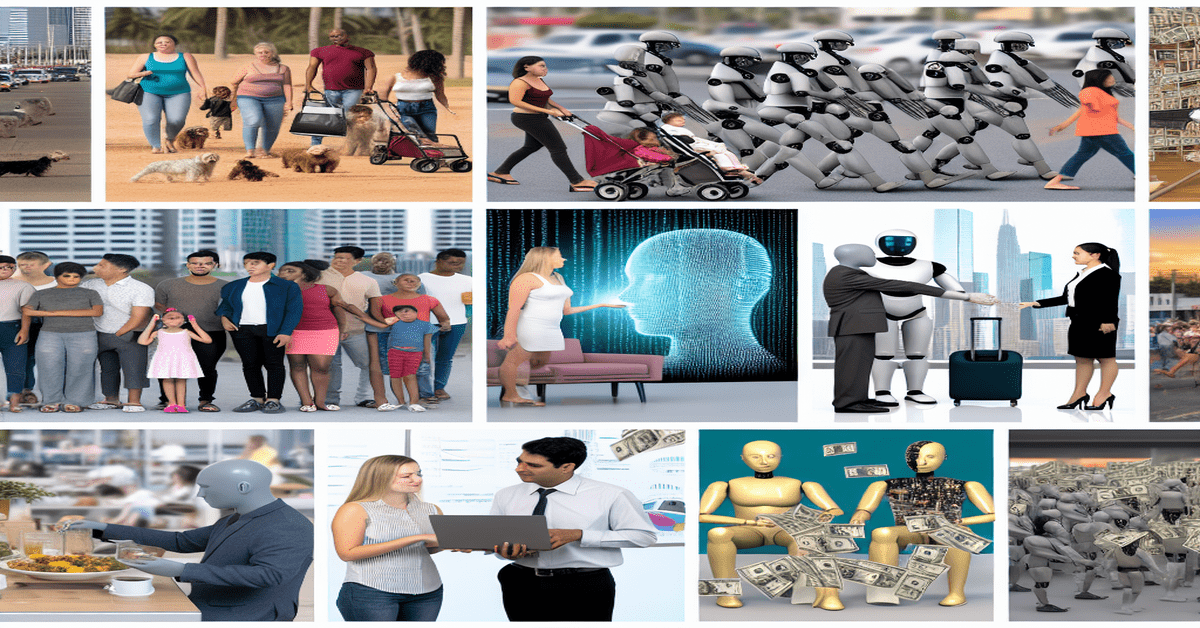The AI Revolution: Is Universal Basic Income the Answer to Job Displacement?
As we stand on the brink of an AI-driven future, the question of how we will adapt to the changing landscape of work has never been more pressing. With the rapid advancements in artificial intelligence and automation, it’s becoming increasingly clear that many jobs traditionally performed by humans are at risk of being taken over by machines. This raises a crucial concern: how will we ensure economic stability for those who may lose their livelihoods to AI?
One potential solution that has gained traction in recent years is the concept of Universal Basic Income (UBI). The idea is simple: provide every citizen with a regular, unconditional sum of money from the government to cover their basic needs. But is UBI the inevitable answer to the challenges posed by AI and automation?
The Automation Wave: Jobs at Risk
The rapid development of AI and automation technologies has already begun to reshape industries across the globe. From manufacturing and transportation to customer service and data analysis, machines are increasingly capable of performing tasks that were once the domain of human workers. A 2019 report by the McKinsey Global Institute estimated that by 2030, up to 800 million jobs worldwide could be displaced by automation.
This shift has far-reaching implications for the workforce. As **AI takes over more jobs**, the risk of widespread unemployment and economic instability grows. Those most vulnerable to job displacement, such as low-skilled workers and those in industries prone to automation, may find themselves struggling to make ends meet. The potential for **exacerbating income inequality** and social unrest is a serious concern.
Universal Basic Income: A Potential Solution?
Enter Universal Basic Income. Proponents argue that UBI could serve as a safety net for those affected by AI-driven job displacement. By providing a guaranteed income to all citizens, regardless of their employment status, UBI could help mitigate the negative effects of widespread job losses.
One of the primary arguments in favor of UBI is its potential to **simplify and streamline existing welfare systems**. Rather than navigating a complex web of benefits and eligibility requirements, individuals would receive a single, unconditional payment. This could reduce administrative costs and ensure that everyone has access to a basic level of financial security.
Moreover, supporters of UBI argue that it could provide people with the **freedom and financial stability to pursue creative or entrepreneurial endeavors**. Without the constant pressure to make ends meet, individuals would have the opportunity to explore new ideas, start businesses, or invest in their education and skills development. This could lead to a more dynamic and innovative economy.
Another potential benefit of UBI is its ability to **stimulate local economies**. By ensuring that everyone has a basic level of disposable income, UBI could boost consumer spending and support small businesses. This could help create new jobs and opportunities, even as traditional employment roles are automated.
Challenges and Criticisms
Despite the potential benefits of UBI, the concept is not without its challenges and criticisms. One of the primary concerns is the **cost and funding** required to implement such a program. Providing a basic income to every citizen would be a massive undertaking, requiring significant financial resources. Critics argue that financing UBI through taxes or the redistribution of existing social welfare funds could be politically and economically challenging.
There is also ongoing debate about the **effectiveness of UBI** in addressing poverty and inequality. Some argue that targeted social programs, such as affordable housing, healthcare, and education, may be more effective in helping those in need. Others question whether providing a basic income would discourage work and productivity.
Testing the Waters: UBI Pilot Programs
To gather more data on the feasibility and impact of UBI, several countries and cities have launched pilot programs. These experiments aim to provide real-world evidence on how UBI affects individuals, communities, and economies.
For example, in 2017, Finland conducted a two-year UBI pilot program, providing 2,000 unemployed citizens with a monthly payment of €560 (approximately $635). The results showed that while the basic income did not significantly impact employment rates, it did improve participants’ well-being and trust in government institutions.
Other notable UBI experiments include the Stockton Economic Empowerment Demonstration in California, which provided 125 low-income residents with $500 per month for two years. The program found that recipients experienced improved mental health, increased financial stability, and were more likely to find full-time employment compared to a control group.
These pilot programs provide valuable insights into the potential benefits and challenges of implementing UBI on a larger scale. However, it’s important to note that the long-term effects and scalability of such programs are still uncertain.
The Future of Work: Navigating the AI Revolution
As we navigate the uncharted waters of an AI-driven future, it’s clear that we need to rethink our approach to work and economic security. While Universal Basic Income may offer a potential solution to the challenges posed by automation and job displacement, its implementation is far from inevitable.
Adopting UBI on a large scale would require significant political will, economic restructuring, and societal acceptance. It’s a complex issue that demands careful consideration and debate.
However, one thing is certain: we cannot afford to be complacent in the face of the AI revolution. As machines become increasingly capable of performing tasks once reserved for humans, we must proactively explore and develop strategies to ensure that the benefits of technological progress are shared by all.
Whether through Universal Basic Income, targeted social programs, or other innovative solutions, we must work together to build a future in which everyone has the opportunity to thrive in the age of AI. The decisions we make today will shape the world of tomorrow, and it’s up to us to ensure that it’s a world we’re proud to leave to future generations.
#AI #Automation #UniversalBasicIncome #FutureOfWork
-> Original article and inspiration provided by Bernard Marr
-> Connect with one of our AI Strategists today at Opahl Technologies


